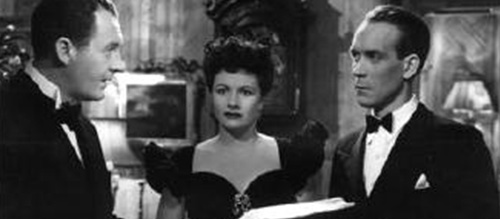Bedelia (1946) Review
Bedelia (1946)
Director: Lance Comfort
Screenwriters: Vera Caspery, Isadore Goldsmith, Herbert Victor
Starring: Margaret Lockwood, Ian Hunter, Barry K. Barnes, Anne Crawford, Beatrice Valley, Louise Hampton
Sharp as a tack and as classy as 1930s Monaco, the (mostly) Yorkshire-set Film Noir Bedelia, based on the book by co-screenwriter Vera Caspery, is an engaging 90 minutes or so of post-war cinema’s finest, this particular black and white thriller eminating from a pre-war peacetime through the story of a woman on the run (Lockwood) and the detective pursuing her (Barnes).
The standout aspect of this film from director Lance Comfort (Temptation Harbor – 1947; Pit of Darkness – 1961) is its creative and somewhat immaculately composed screenplay, which twists and turns expectations to provide thrills within dialogue exchanges, moments of rapidly increased tension and an emotion-driven third act release of said tension worthy of the great work that comes before it.
Although distinctly slower to the eye than the films of the modern era – cuts being replaced by clever camera movements in noticeably long scenes – Bedelia feels very much ahead of its time in a number of ways, the camera adopting a visual artistry that could be likened to the later works of Robert Zemeckis, while the editing dances at different paces to illustrate some of the movie’s most important narrative moments with an authorative full stop.
Margaret Lockwood is simply sensational as the questionable titular character, her performance featuring all of the hallmarks of a typically manipulative Noir femme fatale while featuring an identifiable fragility that, along with elements of the screenplay that accentuate the importance of her character’s journey, elicits a strong sympathy for the character the likes of which was less fashionable at the time of this film’s release. Meanwhile, the supporting male presences of Ian Hunter as Lockwood’s on-screen husband and the intriguing investigator played by Barry K. Barnes each bring their own degrees of intrigue; their opposing physical qualities and the differences in their performance styles being as large a part of this film’s success as Lockwood’s particularly admirable turn in the lead.
While Bedelia isn’t offering the same level of visual mastery available from the all-time greats establishing their names at the time – Hitchcock, Ford, Powell & Pressbuger, etc. – it is clear that this film has been effectively envisioned and has been done so by a director with a particularly noticeable flair for drama and romance. The camera seems to always be moving, evolving the action within the frame based upon its position within it – the hallmarks of a great blocking director – while the speed at which conversations come into contact with each other feels remarkably modern given the styles and preferences on offer in much of cinema at the time.
Bedelia isn’t necessarily a blow your socks off classic, nor is it a film British cinema has typically associated with its nation’s largest county, Yorkshire, but it is a thrilling watch nonetheless; the kind of journey you’re not going to want to depart from early; a remarkable piece of rare British noir with a surprisingly modern take on the leading female played to perfection by the immaculate Margaret Lockwood.
19/24


